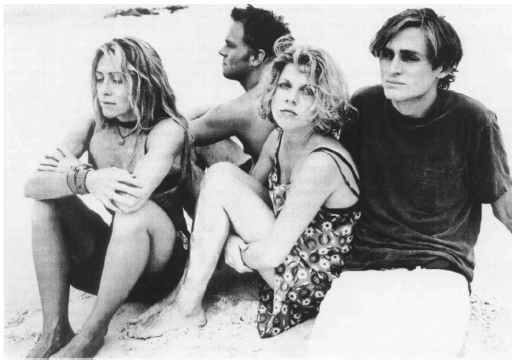2016 is shaping up to be a great year for fans of music from 1996. Both dreamy alt-rockers Belly and noisy shoegazers Lush have announced reunion tours – the latter also promising new music – while the ever-present rumours of a Spice Girls comeback seem to be swelling. It’s obviously a big business – but how has it come to be so?
The most anticipated reunions are the ones where the acts in question seem to have left enough potential to explore further in their catalogues. Lush were beginning to escape the shackles of shoegaze production and grow exponentially as songwriters when their trajectory was tragically cut short by the demise of drummer Chris Acland. Meanwhile, Belly only recorded two albums and a handful of b-sides – an entire career of only enough to fill two full discs and no more. The yesteryear comeback of My Bloody Valentine hinged on the distance between their classic opus Loveless and the lack of fresh material in the passing two decades, while other cult favourites such as Portishead and Mazzy Star have returned to deliver on the promise of their feted early material.
But there’s just as many acts for whom it feels unnecessary. ITV2 has had one of the great success stories of music television in years with its documentary series The Big Reunion, but it would be naïve to suggest that viewers were more interested in a run-through of Honeyz’ Top Twenty hits than a close look at the ongoing saga of Kerry Katona’s tragic life story. The Spice Girls’ brand of feminism seems simplistic, if not uncomfortable, in the age of Twitter social justice. All Saints may have made some great pop singles at the turn of the millennium, but ten years ago they all but admitted they were reforming for financial reasons, and their upcoming new material runs the risk of losing its momentum to media scepticism.
That cynicism is so pernicious now that every reunion seems framed by cash and career motives, more than any desire to see previous heroes succeed on today’s terms. And it’s understandable – we’re in an age where every anniversary seems marked by another deluxe re-issue and unimaginative think-pieces, regurgitating the same narratives. The Britpop market is especially guilty of this: take the industry that seemed to form last year around the celebration of Oasis being at their peak twenty years ago, the critical gaze that blew the influence of their first two albums to unwieldy proportions while turning a blind eye to the band’s rapid decline into stasis and irrelevancy.
The question remains: do we want to see yesterday’s successes in today’s world? It seems the answer is not – Belly frontwoman Tanya Donelly has released four solo albums, each better than the last, and until the recent announcement of the band’s reunion, was so maligned that her most recent series of EPs were self-released to minimal fanfare. Emma Anderson of Lush was one half of noughties electronic indie duo Sing-Sing, who were received better than Lush in their prime but never with the same presence. Simply put, it doesn’t fit the narrative to have had success outside of the projects that make one’s name – Slowdive might have been a huge draw for Spanish festival Primavera Sound, but where’s the acclaim for spin-off group Mojave 3?
If an artist fades away or disappears for years at a time, then they’re portrayed as comeback cash-chasers. If an artist continues to make music, it doesn’t matter how good or bad it becomes, eventually they’ll fall out of favour and be portrayed as has-beens. Fair or not, the conversation around reunions will always be this way. Maybe if it wasn’t, then these reunions would be different – would the unfinished business of these bands really seem unfinished?
At the same time, nostalgia and familiarity are not inherently bad reasons to enjoy music. Especially acts that didn’t get their dues at their peak, or faded from view before a new generation of listeners could experience their fandom first-hand. The Sundays, Pale Saints, Cocteau Twins: please, please take all the money it requires to get back into the studio and back on stage.




